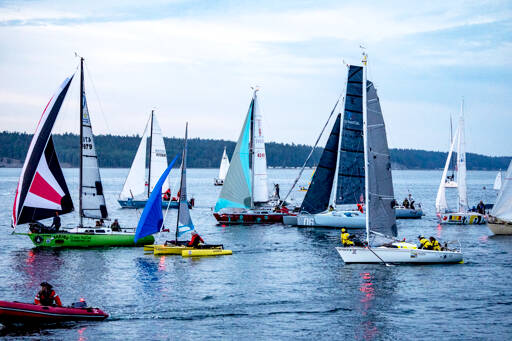PORT TOWNSEND — It was a windy start to the 2024 Race to Alaska, and while several boats were able to complete the first leg of the race to Victoria, British Columbia, several others had to wait overnight before crossing the Strait of Juan de Fuca.
“There was wind in the morning but didn’t reach its full crescendo until about 4 p.m. (Sunday), by which point most boats were off of the water,” said Jesse Wiegel, race boss for Northwest Maritime, which hosts the race.
Teams have 36 hours to reach Victoria for what’s known as the proving ground. With gusts between 20 mph and 30 mph, Wiegel said several boats took refuge inside the Dungeness Spit overnight and made the crossing early Monday morning, when the weather was calmer.
Two human-powered teams, the stand-up paddleboarder SUP N IRISH and two-person rowboat Hard on Port, took refuge in the San Juan Islands.
As of mid-day Monday, two teams were still on their way to Victoria with only hours to spare. According to the race’s live tracker, the one-person pedal-power vessel team Barely Human was nearing Victoria Harbor while SUP N IRISH was still inside the San Juan Islands.
Forty-three teams left from Port Townsend on Sunday — only one entrant, team Fossil Fuel, wasn’t able to make it to the starting line — and at least 32 will leave Victoria on Wednesday.
Seven of the teams that left Port Townsend only ever intended to reach Victoria, Wiegel said, but of the teams that were planning to run the whole race, several already have bowed out.
Wiegel said it’s often the case that the smaller, human-powered vessels struggle to make the crossing, particularly as the weather picks up over the day.
Hard on Port, the two-person rowboat team, called from Friday Harbor to say they wouldn’t be making it to Victoria.
“They were planning to do the full race,” Wiegel said. “They knew what it was going to be, coming up against the weather. I think they got kind of beat up with the weather.”
The monohull sailboat team Occam’s Laser — whose destination was only ever Victoria — suffered a broken boom and had to be towed by the Canadian Coast Guard. The one-man sailing dinghy team Make Fetch Happen also pulled out after taking shelter near Sequim Bay.
This is the last year the Race to Alaska, or R2AK, will be held annually, as Northwest Maritime announced earlier this year the race will be moving to a biennial schedule.
The first team to reach Ketchikan will walk away with $10,000 in prize money.
Last year, the monohull sailboat team We Brake for Whales came in first with a time of five days, 18 hours and 59 minutes. The last team to arrive, the kayaker Sporting Chance, clocked in at 18 days, 23 hours and nine minutes.
The only rules of the race are vessels cannot be motorized, and no help can be pre-arranged along the way. Teams are free to stop and make use of facilities at any of the towns along the route, but support teams are not allowed.
Remaining teams will leave from Victoria at noon Wednesday.
“The scene on the dock right now is there’s people hanging out, they’re doing repairs on the boats,” Wiegel said.
Some boats have suffered damage in the crossing and are trying to make repairs before the main race starts. Many of the sailboats have replaced their motors with pedal-power devices, and Wiegel said team Loose Screw had theirs damaged in the crossing and are looking to make repairs before Wednesday.
The custom-built trimaran team Malolo was the first to arrive in Victoria, making the crossing in less than five hours.
That wasn’t a surprise, Wiegel said, as Malolo was the fastest boat in this year’s fleet.
“That does not mean it will win,” Wiegel said. “They’ve been damaged out of the race before.”
________
Reporter Peter Segall can be reached by email at peter.segall@peninsuladailynews.com.

